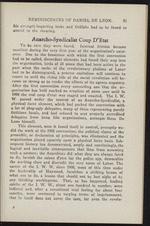| 1 |
 |
“...so strong as to render the efforts of its agents nugatory.
After the first convention every succeeding one that the or-
ganization has held marked an eruption of some sort until in
1908 the real coup detat was staged and enacted. The I. W.
W. passed under the control of an Anarcho-Syndicalist, a
physical force element, which had packed the convention with
a lot of plug-ugly delegates, many of them representing purely
fictitious locals, and had refused to seat properly accredited
delegates from bona fide organizations, amongst these De
Leon himself.
This element, once it found itself in control, promptly Un-
did the work of the 1905 convention; the political clause of the
preamble, or declaration of principles, was eliminated and the
organization placed squarely upon a physical force basis. Sub-
sequent history has demonstrated, amply and convincingly, the
logical and inevitable consequences that flow from assuming
such a posture; the Anarchists did what they are always fated
to do, furnish...”
|
|
| 2 |
 |
“...officialdom heaved a sigh of relief, for
the rumpus at the second I. W. W. convention, the setting up
of a bogus I. W. W., and the withdrawal of the Western Fed-
eration of Miners from both factions of the I. W. W. ex-
tricated their party from a very tight and unpleasant situation.
The Time But Not the Men
All sincere industrial unionists were at that time hopeful
that there was at least one man among the leaders of the West-
ern Federation of Miners who would exert all his influence in
favor of the bona-fide I. W. W. and against the reactionists of
the Mahoney type in that organization. This man was thought
to be Haywood as it was generally believed that he would be
acquitted, and that once free he would with Vincent St. John
turn the tide in the Western Federation of Miners. This ex-
pectation, as. we shall see later, was not fulfilled.
At times like those, when the brutal, bloodstained hands
of the monstrous capitalist class in Idaho sought to stamp out
the economic organization of the wage...”
|
|
